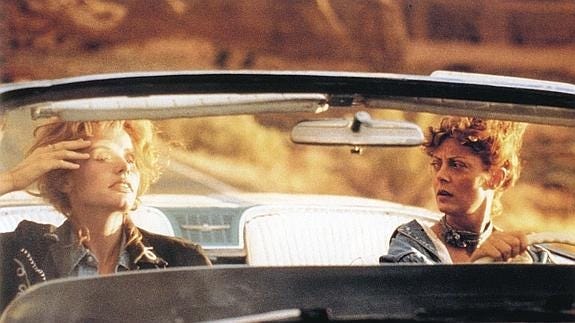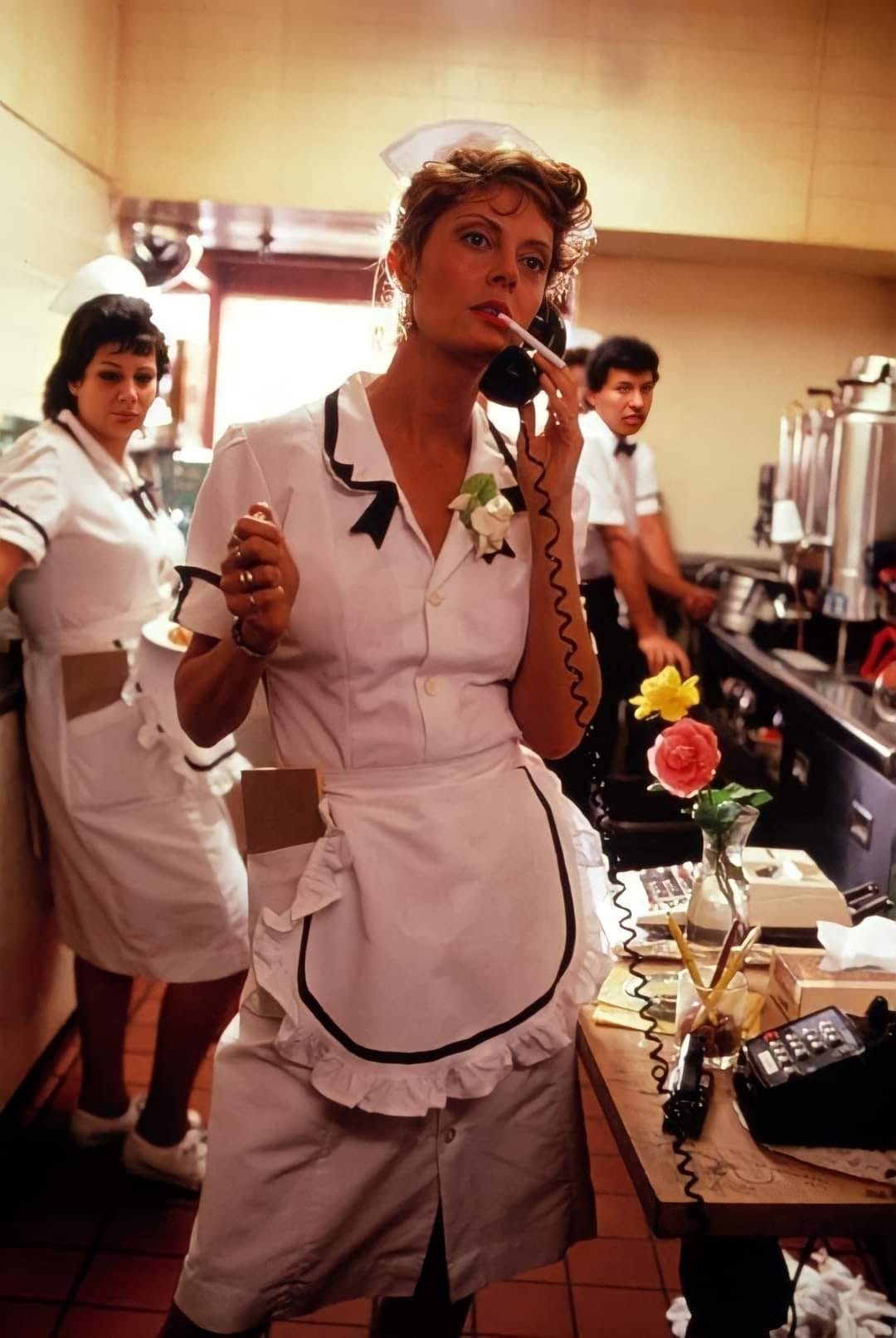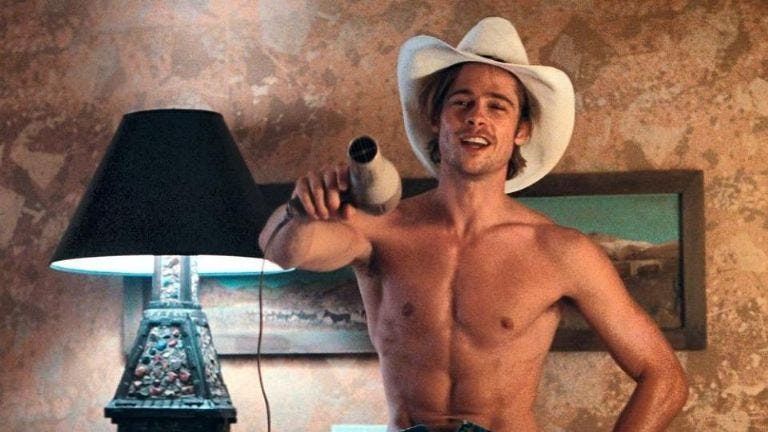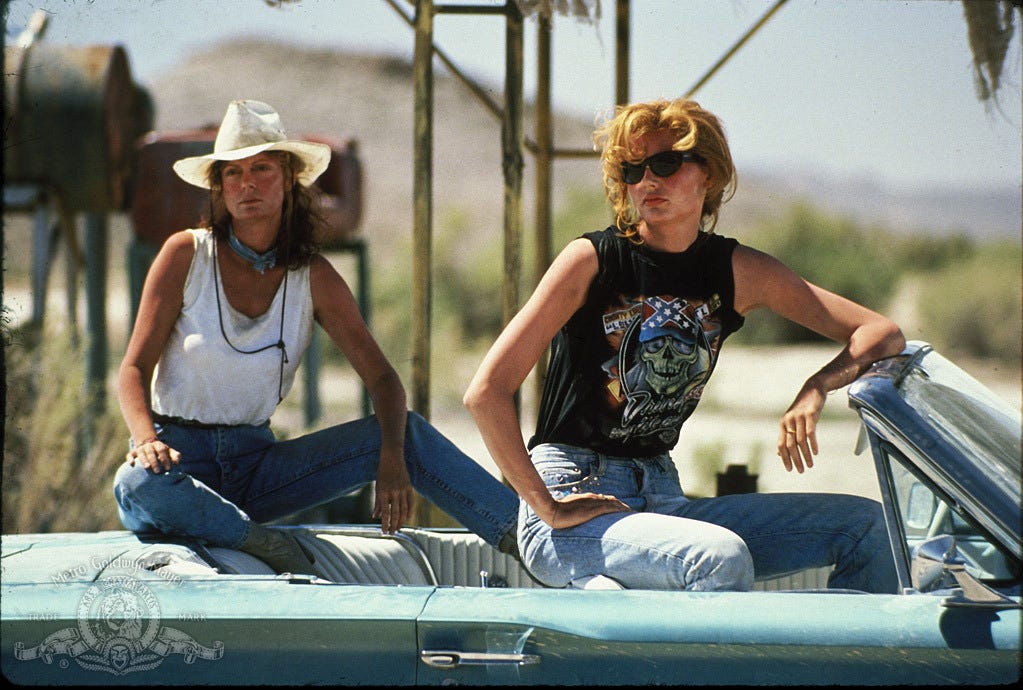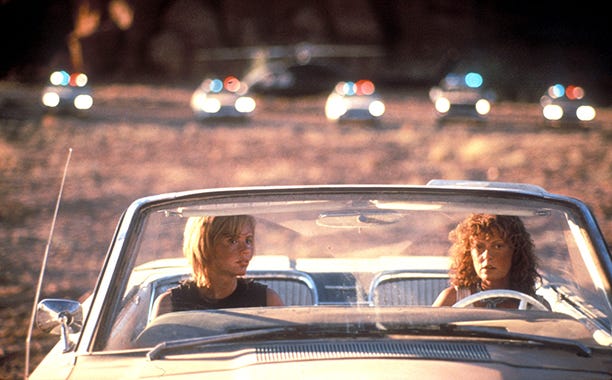Thelma & Louise (1991)
Casting is one of the most important aspects of filmmaking. I've come to realise this from making short films as much as watching feature-length productions. Yes, a great script is vital - but without the right actors to interpret that script and play off each other, a film can end up being of a shadow of what could have been. A great actor can sell your dialogue, can bring a level of reality to the story that otherwise may be lacking. Aside from individually gifted actors, the chemistry that is generated between those actors is something intangible, hard to define in words.
Thelma & Louise is something I would consider to be the perfect script, but cast two actresses other than Susan Sarandon and Geena Davis and the film just wouldn't be as emotionally impactful. They seemed destined to have played these roles, perhaps the most defining roles of their careers. There were a lot of high profile actresses in contention: Michelle Pfeiffer, Cher, Goldie Hawn, Meryl Streep, Julia Roberts, Meg Ryan...and while yes, you could imagine them in these parts, I can't help but believe it would have been lesser film.
You have Sarandon's earthiness, her world-weary cynicism, her soulfulness. You have Davis' energy, her forthrightness, her goofiness and grace. Together there is an alchemy that occurs rarely on screen, but when it does, you have the makings of cinematic gold. They are characters you root for. You want them to overcome every obstacle, to succeed against the odds. You want a story that will do them justice, that will give them every opportunity to shine, comedically, dramatically, to generate the ultimate catharsis. Thelma & Louise has all of that.
Penned by Callie Khouri (in what extraordinarily is her debut feature script) and directed by master filmmaker Ridley Scott (best known at that point for his sci-fi outings Alien and Bladerunner) the story centres on two female friends a small town in America, maybe the Mid-west (or maybe the farther South), close enough to drive to the Grand Canyon in a matter of days, in any case. Thelma is a housewife (with a cantankerous husband) while Louise is a good fifteen years older, a world-weary waitress, the kind of no-nonsense yet congenial type you'd want serving you waffles and coffee at the diner.
The two decide to get away for a fishing trip, mainly so Thelma can escape her husband for a couple of days. How close they are as friends is not actually clear, but by the end of their vacation turned crime spree turned soul odyssey they are two women fused into one glorious entity, soaring toward the sun. Their journey is one of rebellion and spiritual transformation, a road trip that sees them become fugitives and reliant on each other to survive a run from the law.
In the opening scenes we are instantly given insight to Louise' character when she remarks to two young female customers that they're too young to be smoking, and that it "spoils your sex drive". Cut to Louise lighting one up in the kitchen. She is a woman scarred by experience, who is beyond caring about male attention. Meanwhile Thelma performs her first act of rebellion by not informing her husband about the trip at all. The two ladies pack at their respective homes, Louise deciding to take a pistol with her. Before heading off, they snap their iconic selfie with an instant camera and hit the road in their turquoise Thunderbird convertible.
It's at a busy tavern on the way that their trip takes a serious turn. A sleaze-ball philanderer buys the ladies drinks and tries to pick Thelma up. They drink and dance together until Thelma's head starts to spin. Out to the parking lot for some air, the man begins to feel Thelma up and coerce her into having sex. He slaps her around and curses at her, that is until Louise appears, pointing her pistol directly at him. It looks as though she has diffused the situation, until he talks back to her in vulgar defiance. Louise snaps and shoots him dead.
From that moment they are on the lam, with Louise planning to flee to Mexico. Thelma agrees to accompany her, and together they must use all of the smarts and savings they possess in order to outrun the authorities. Louise calls for a money transfer from her on-again off-again boyfriend (played by Michael Madsen), while Thelma gets distracted by a young hitchhiker they meet on the road. He's charismatic, a one-of-a-kind beauty with abs of steel. In fact, he's Brad Pitt. In his breakthrough role. Again, the casting department must have been working overtime.
He convinces the women to give him a ride, and even finds his way into Thelma's motel room (where she is tasked with guarding the money). He admits to her he is in fact a robber, even demonstrating his technique for holding up convenience stores. He then proceeds to make love to her in a way her husband never did. Meanwhile, Louise and her boyfriend work out their issues in the other room. In the morning, lo and behold, the money's gone.
This is Khouri demonstrating a key element of screenwriting: make things harder for your characters. Just when we think they are succeeding, give them a major setback. Make it unbelievable hard. Then make them use the knowledge they have just obtained to turn the situation around. Hence while Louise is devastated by the loss of funds, Thelma takes an opportunity to hold up a gas station store, and makes off with the contents of the cash register. Louise is incredulous but quickly obliges in taking the wheel to make their escape. Meanwhile the police are tracking them (including the lead investigator played by Harvey Kietel). Thelma calls her husband to find out if he is aware of their situation, and intimates that he does simply from his tone of his strained "hello". They soon enter a long distance dialogue with the authorities, who urge them to put a halt to their escapade.
It's true that lot of the men in the film are portrayed in a negative light. Thelma's husband, a cop that stops them for speeding (and meets an unfortunate fate), Pitt of course, but particularly the crude trucker who harasses the woman and eventually comes to feel their wrath. Kietel and Madsen appear to be the only ones with any integrity. The film was controversial upon release, as some viewed the two leads as man-hating feminists out to destroy the patriarchy. This is a rather simplistic perspective that I believe was only looking to find fault with a crime road movie that dared to put women as the protagonist.
A lot of the film hinges on the idea of trauma. Louise was previously raped in Texas which has affected her so badly she wants to avoid the state entirely, even when she is in a race to cross the border. That trauma informed her decision to pull the trigger, it informs how she reacts to each of their aggressors. Maybe if it hadn't happened they wouldn't have found themselves in this situation. Or maybe if the philanderer hadn't attempted to rape Thelma. But there is no maybe, there is only the fact of the matter.
Aside from the politics, visually the film is fantastic. Scott is firing on all cylinders, his camera jostling amongst the line-dancers in the tavern, sweeping across the horizon of the vast landscape, circling the Thunderbird convertible as it zooms onward, tracking the looming desert rocks by night. There is a moment of reprieve with Marianne Faithful playing on the radio and the women allowing the music to wash over them. The song speaks directly to the inner journey of the characters. Then there are the strains of Hans Zimmer's epic electric guitar that underscores the kinship felt between our two heroines, that seems to gesture toward the possibility of transcendence. The ending in itself was controversial, was this film promoting suicide? Cornered at the edge of the Grand Canyon, these two women had nothing left to lose. It was incarceration or freedom. As Thelma confides in Louise in a moment of solace before their final chase "Something's crossed over in me, and I can't go back". The only way is forward.




